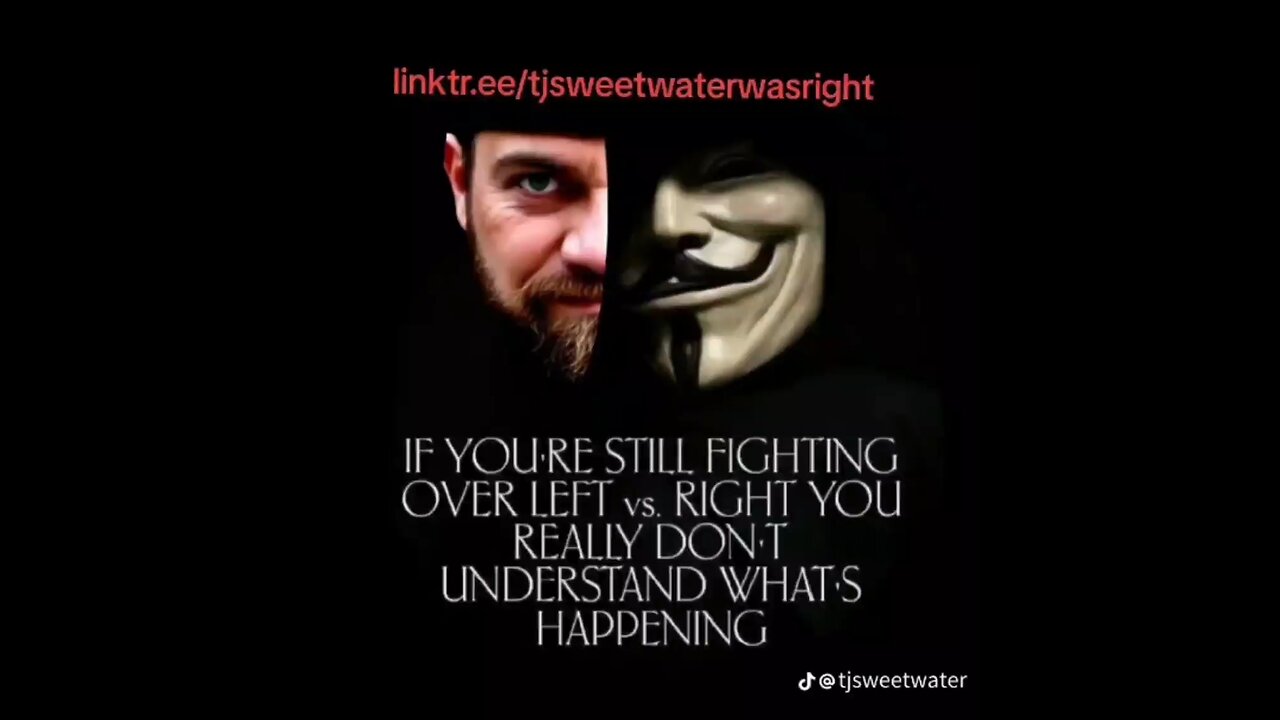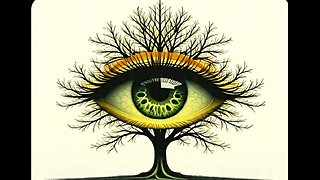Premium Only Content

HUMAN MASS EXTINCTION IF WE DON'T STOP THIS
Saturday October 18th 2025
Knowledge
&
Consciousness
&
Lack There Of
You still seem to have overlooked the most crucial element of your "social" media feed: a verifiable timeline grounded in primary sources—facts you can revisit, scrutinize, and authenticate over time. That's why hindsight feels so damn sharp. It's both captivating and exasperating to watch decent folks, family, and friends settle into this haze of unexamined comfort, blind to the elephant stomping through the room. That beast? Politicians and ideologues pleading for the government to "fix" the messes they've engineered themselves, as if they stumbled into their own chaos without a single functioning neuron. Anyone with a shred of conscience and presence—truly tuned into their words, thoughts, and deeds—sees it plain as day.
What's truly baffling is how many refuse to trace the path from Point A to Z: the deliberate steps, the behaviors, the manipulations that bridge the gap. To get real with ourselves, we have to wield critical thinking like a scalpel—dissecting cause and effect, the Hegelian dialectic of problem-reaction-solution, reverse psychology, and the rote "facts" force-fed to us in youth. Who delivered those lessons? At what stage of our brain's wiring? And why do we rarely circle back to audit them once the prefrontal cortex kicks in? I've done it myself: revisited school curricula and uncovered vast omissions, blatant biases, and outright fabrications. Take those Mercator maps in textbooks, bloating continents to warp our sense of scale and superiority—subtle psyops etched into impressionable minds. Or the "norms" drilled in during formative years, behaviors we'd recoil from today. Layer on the relentless barrage of marketing, ads, films, TV, and tunes, crafting a worldview that's not yours—it's theirs, recycled from the same poisoned well their forebears drank from. They're oblivious to basics any half-decent search uncovers in seconds, yet they'd sooner scream into the digital void, convinced their outrage bends reality or topples the rigged game they're unwittingly propping up.
Point this out, and what happens? Not reflection—nope, they flare up, emotions hijacking the wheel, replaying the very scripts we just decoded. The irony stings because we've all clawed through that mire ourselves: the brutal audit of our own imprinted blind spots, the cause-effect chains we triggered before awakening to the now. That's why it's so glaringly obvious to those who've endured the gut-punch of dismantling cozy delusions. It underscores the stakes in chasing unvarnished truth amid today's fog. Human perceptions? They're wildcards, veering miles from reality—and by definition, they're not truth. Our gig as humans is to wrestle our lens into alignment with facts, not the other way around. But ego, urban isolation, and that seductive concrete jungle keep most chained, forever squinting at fragments instead of the panorama.
Comfort? That's stagnation's cradle. Growth demands friction—those "growing pains" we romanticize but dodge. Folks fantasize truth as a fluffy blanket, tailored to their biases and whims. Spoiler: it's not. It's raw, jagged, and indifferent to your feelings. Without that edge, you stagnate. The hallmark of real smarts is dead simple: the humility to flip your script, to tweak your take on the evidence instead of calcifying into "stuck on stupid." Cling to first principles like the Founding Fathers' originals—slavery baked right in—and we'd still be debating human chattel as "tradition." Real evolution? It demands ditching the dogma you once swore was gospel: unlearning the taught, questioning the believed, and pivoting hard. The verdict's crystal: without that mental agility, we're just echoes in a cage we built.
### What Are Cognitive Biases?
Cognitive biases are systematic patterns of deviation from rational judgment, where our brains use mental shortcuts (heuristics) to process information quickly, often leading to errors in thinking, decision-making, and perception.
These "cold" biases stem from cognitive limitations like mental noise, while "hot" ones arise from emotions or motivations, such as wishful thinking.
Evolutionarily, they're efficient survival tools—better to err on the side of caution than deliberate endlessly—but in modern life, they can distort reality, fuel poor choices, and perpetuate misinformation.
### Why Do They Matter?
Biases affect everything from daily judgments (e.g., hiring decisions) to global issues (e.g., policy-making or echo chambers on social media). Awareness is the first step to mitigation: techniques like seeking diverse viewpoints, slow deliberate thinking (à la Daniel Kahneman's System 2), or debiasing checklists can help realign perceptions with facts.
### Main Categories
Biases are often grouped by cognitive tasks:
- **Decision-making**: Affecting choices under uncertainty (e.g., anchoring).
- **Belief formation**: Distorting how we interpret evidence (e.g., confirmation).
- **Behavioral/Social**: Influencing attributions and interactions (e.g., fundamental attribution error).
- **Memory/Recall**: Warping what we remember (e.g., hindsight).
- **Estimation**: Skewing probability assessments (e.g., availability heuristic).
### 15 Common Cognitive Biases
Here's a curated list of some of the most impactful ones, with brief explanations and real-world examples:
- **Confirmation Bias**: Seeking or interpreting info that confirms preexisting beliefs while ignoring contradictions. *Example*: Cherry-picking news that aligns with your politics, reinforcing divides.
- **Availability Heuristic**: Overestimating event likelihood based on easily recalled examples. *Example*: Fearing shark attacks more than car crashes after a viral story, despite stats.
- **Anchoring Bias**: Over-relying on the first piece of info encountered. *Example*: A high initial price tag making a "discount" seem like a steal, even if overpriced.
- **Dunning-Kruger Effect**: Low-ability people overestimate skills; experts underestimate. *Example*: Novice traders confidently risking big, ignoring expertise gaps.
- **Gambler's Fallacy**: Believing past random events influence future ones. *Example*: Betting on red after black streaks on roulette, assuming it's "due."
- **Loss Aversion**: Losses feel twice as painful as equivalent gains. *Example*: Holding losing stocks too long to avoid regret, missing better opportunities.
- **Sunk Cost Fallacy**: Continuing bad investments due to prior effort. *Example*: Sticking with a failing movie because you've watched half, or a toxic job.
- **Framing Effect**: Decisions sway based on info presentation. *Example*: Preferring a treatment with "90% success" over "10% failure," despite identical odds.
- **Hindsight Bias**: Seeing events as predictable post-occurrence ("I knew it!"). *Example*: Claiming a election outcome was obvious after results, skewing learning.
- **Optimism Bias**: Underestimating personal risks. *Example*: "It won't happen to me" leading to skipped backups or unsafe driving.
- **Fundamental Attribution Error**: Blaming others' flaws on character, not situations. *Example*: Judging a late colleague as lazy, ignoring traffic jams.
- **Halo Effect**: One positive trait colors overall perception. *Example*: Assuming an attractive person is also intelligent or kind.
- **Illusory Truth Effect**: Repeated falsehoods feel true. *Example*: Fake news gaining traction through shares, eroding trust in facts.
- **Status Quo Bias**: Preferring the current state over change. *Example*: Sticking with default phone plans, even pricier ones.
- **Overconfidence Effect**: Excessive faith in one's judgments. *Example*: Entrepreneurs betting everything on untested ideas, high failure rates ensue.
For deeper dives, check resources like Wikipedia's full list (over 180!) or The Decision Lab's behavioral science breakdowns. Spotting these in yourself? That's the real power move. What's one bias you've wrestled with lately?
### What is the Hegelian Dialectic?
The Hegelian dialectic is a philosophical method developed by Georg Wilhelm Friedrich Hegel (1770–1831) to explain how ideas, history, and reality evolve through contradiction and resolution. It typically follows a triadic structure—though Hegel didn't strictly use those terms—of **thesis** (an initial idea or state), **antithesis** (its opposing force or negation), and **synthesis** (a higher resolution that preserves and transcends both). This process drives progress toward greater complexity and truth, often visualized as a spiral rather than a straight line.
### Logical and Philosophical Examples
Hegel's *Science of Logic* provides foundational illustrations, showing how abstract concepts unfold dialectically.
- **Being, Nothing, Becoming**: Pure "Being" starts as an empty, undetermined thesis—simple presence without qualities. It negates itself into "Nothing," its antithesis (pure absence), revealing their identical emptiness. The synthesis, "Becoming," unites them as dynamic change, the first concrete concept containing both presence and absence.
- **Something, Other, Being-for-Itself**: "Something" (thesis) defines itself against an "Other," but this leads to endless opposition (antithesis), as each "something" becomes another's "other." The synthesis, "Being-for-Itself," resolves this by achieving universality—embracing the opposition in a self-sufficient whole.
- **Measure, Measureless, Essence**: "Measure" (thesis) fixes quality and quantity together. Its limits push it to the "Measureless" (antithesis), an unbound chaos. "Essence" (synthesis) emerges as their inner unity, a deeper reality beyond surface contradictions.
These examples highlight *sublation* (Aufhebung): the synthesis cancels, preserves, and elevates the prior stages.
### Historical Examples
Hegel applied the dialectic to world history as the unfolding of "Spirit" (Geist) toward freedom.
- **Oriental Despotism to Greek Democracy to Constitutional Monarchy**: In ancient Eastern empires (thesis), freedom belonged only to the despot—one rules, all serve. Greek democracy (antithesis) negated this by extending freedom to citizens (but excluding slaves). The Germanic-Christian synthesis fused them into modern constitutional states, where individual freedom is universal and balanced with rule of law.
- **Capitalism to Communism to Liberal Democracy**: Capitalism (thesis) emphasized free markets and individual enterprise. Communism (antithesis) arose as a radical opposition, seeking equality through state control but leading to authoritarian failures. The synthesis is post-WWII liberal democracy, blending market freedoms with social welfare and democratic oversight—seen in the fall of Eastern Bloc regimes.
### Influence and Adaptations
Karl Marx "inverted" Hegel's idealism into historical materialism, using dialectic for class struggle: bourgeoisie (thesis) vs. proletariat (antithesis) yielding a classless society (synthesis). Everyday echoes appear in debates (e.g., a rigid policy challenged by criticism, resolved in compromise) or nature (bud negates seed; flower synthesizes both into fruit).
This framework underscores progress through tension, but critics note its Eurocentrism and teleological optimism. For deeper reading, explore Hegel's *Phenomenology of Spirit* or *Philosophy of History*.
What is the Marxist Dialectic?
The Marxist dialectic, or dialectical materialism, is Karl Marx and Friedrich Engels' adaptation of Hegel's idealistic dialectic into a materialist framework. It posits that history, society, and nature evolve through inherent contradictions in material conditions—economic, social, and productive forces—rather than abstract ideas. The process follows a similar triad: thesis (existing order), antithesis (opposing forces), and synthesis (resolution transcending both), but grounded in class struggle and real-world dynamics. This method analyzes change as inevitable, driven by tensions like exploitation or scarcity, aiming toward human emancipation.
Core Philosophical and Economic Examples
Marx and Engels deployed dialectical materialism to dissect capitalism's inner logic, revealing its self-undermining contradictions.
Commodity Production and Value: In Capital (1867), the commodity embodies a core contradiction—thesis: use-value (practical utility, e.g., a coat for warmth); antithesis: exchange-value (abstract labor quantified as price, fetishized in markets). This breeds crises like overproduction, where abundance for profit starves workers. Synthesis: Socialism, where production aligns directly with social needs, abolishing the commodity form.
Class Antagonism: Feudalism's lord-serf hierarchy (thesis) clashed with emerging merchant capital (antithesis), sparking bourgeois revolutions (e.g., French Revolution, 1789). The synthesis—capitalism—unleashes industrial forces but sows proletarian-bourgeois antagonism, culminating in revolutionary socialism as the next stage.
Base and Superstructure: Economic base (thesis: mode of production) determines superstructure (antithesis: laws, culture, ideology). Contradictions arise when the base evolves (e.g., feudal tech enabling capitalism), forcing superstructure reforms. Synthesis: A harmonious society where ideas serve collective material progress.
These examples illustrate negation of the negation: progress negates the old but retains its advances, like capitalism building on feudalism's ruins.
Historical Applications
Dialectical materialism framed 19th–20th-century revolutions as predictable outcomes of contradictions.
Russian Revolution (1917): Tsarist autocracy (thesis) met industrial proletarian unrest (antithesis), synthesized in Bolshevik rule—though Stalinist distortions later ossified the dialectic into dogma.7b7043
Chinese Revolution (1949): Semi-feudal imperialism (thesis) clashed with peasant-communist forces (antithesis), yielding Mao's synthesis of agrarian socialism, adapting dialectics to non-Western contexts.
Marx viewed history as a spiral of such transitions: primitive communism → slavery → feudalism → capitalism → socialism → communism.
Modern Applications
Beyond orthodoxy, dialectical materialism endures as a tool for critiquing contemporary capitalism, informing activism, science, and social theory. Its relevance persists amid crises like inequality and climate collapse, where contradictions (e.g., endless growth vs. finite resources) demand resolution.95da60
Labor and Social Movements: In gig economies, platform capitalism (thesis: flexible work) generates precarity and union resistance (antithesis), synthesizing demands for worker cooperatives or UBI. Marxist organizers use it to map strike strategies, viewing concessions as temporary syntheses en route to systemic overhaul.aa274a
Environmental Dialectics: Fossil fuel dependency (thesis) provokes ecological backlash (antithesis, e.g., climate activism). Synthesis: Green socialism, integrating renewable tech with decommodified production. Thinkers apply it to "metabolic rifts"—capital's rift with nature's cycles.82d9e5
Science and Everyday Life: In physics or biology, it counters reductionism by emphasizing emergent contradictions (e.g., quantum wave-particle duality as thesis-antithesis). Practically, individuals use it for self-analysis: personal burnout (thesis from workaholism) meets boundary-setting (antithesis), yielding balanced routines.1a79c4 J.D. Bernal extended it to 20th-century science, arguing Marxism amplifies empirical inquiry by revealing social biases in knowledge production.5bdef0
Global South Development: In postcolonial contexts, neocolonial extraction (thesis) fuels anti-imperial movements (antithesis), synthesizing hybrid economies blending state planning with local autonomy—echoing Marx's underdevelopment theory.cc8a21
Critics decry its deterministic bent, yet non-Marxists in ecology, feminism, and critical theory borrow it for dissecting power imbalances.76b1eb For deeper dives, see The German Ideology (Marx/Engels, 1846) or modern texts like David Harvey's Seventeen Contradictions and the End of Capitalism (2014).
### What is the Frankfurt School's Adaptation of the Marxist Dialectic?
The Frankfurt School—formally the Institute for Social Research (founded 1923 in Frankfurt, Germany)—comprises critical theorists like Max Horkheimer, Theodor Adorno, Herbert Marcuse, Erich Fromm, and Walter Benjamin. They adapted Marxist dialectical materialism into **critical theory**, shifting from orthodox Marxism's economic focus to a broader critique of capitalism's cultural, psychological, and administrative dimensions. This "Western Marxism" retained the dialectic's thesis-antithesis-synthesis but infused it with Freudian psychoanalysis, Weberian bureaucracy analysis, and Hegelian negativity—emphasizing unresolved contradictions over revolutionary optimism. The goal: emancipatory critique exposing domination in advanced industrial societies, where class struggle recedes behind ideology and mass manipulation.
### Core Philosophical Adaptations
Frankfurt thinkers "dialecticized" culture and subjectivity, viewing contradictions not just in production but in everyday life and reason itself.
- **Dialectic of Enlightenment (Horkheimer & Adorno, 1944)**: Enlightenment rationality (thesis: liberating progress via science/reason) negates into instrumental reason (antithesis: dominating myth, e.g., atomic bomb as "enlightened" destruction). Synthesis? None—unresolved "negative dialectic" reveals reason's complicity in barbarism, urging perpetual critique over utopian closure.
- **Culture Industry (Adorno & Horkheimer)**: Mass media/culture (thesis: democratic entertainment) commodifies art into standardized "products" (antithesis: enforcing conformity, stifling critique). No tidy synthesis; it perpetuates false needs, alienating consumers—e.g., Hollywood's formulaic films as "enlightened" escapism masking exploitation.
- **Authoritarian Personality (Fromm & Adorno et al., 1950)**: Liberal individualism (thesis) clashes with fascist tendencies (antithesis: sadomasochistic submission). Dialectic yields psychological profiles of prejudice, blending Marx with Freud to diagnose how capitalism breeds authoritarianism without overt class war.
These adapt Marx by "negating the negation" inwardly: contradictions persist, fueling critique rather than predicting proletarian triumph.
### Historical Applications
Exiled by Nazis (1930s–1950s, relocating to Columbia University then back to Frankfurt), the School applied dialectics to fascism and postwar capitalism.
- **Critique of Fascism**: Nazism as capitalism's dialectical extreme—thesis: bourgeois democracy; antithesis: total mobilization; unresolved in "administered society" (Adorno), where bureaucracy supplants overt terror.
- **1960s New Left Influence (Marcuse)**: In *One-Dimensional Man* (1964), advanced capitalism (thesis: affluent welfare state) absorbs dissent via "repressive desublimation" (antithesis: sexual liberation as control). Synthesis: Eros-driven revolution via students/marginalized groups, inspiring protests against Vietnam War and consumerism.
### Modern Applications
Frankfurt adaptations permeate cultural studies, identity politics, and postmodern theory, critiquing neoliberalism's "totality."
- **Cultural Hegemony and Identity**: Extending Gramsci (via Frankfurt lens), dialectics dissect "woke capitalism"—thesis: progressive branding; antithesis: performative allyship masking inequality. Synthesis? Fluid coalitions, as in #MeToo's unresolved tensions between empowerment and co-optation.
- **Digital Dialectics**: Adorno's negativity applied to algorithms—thesis: connective tech; antithesis: surveillance echo chambers. No resolution, but calls for "micrologies" of resistance, e.g., decentralized media countering Big Tech.
- **Ecological Critique**: Blending with later thinkers like Jürgen Habermas, dialectics frame climate denial—rational discourse (thesis) negated by corporate "lifeworld colonization" (antithesis)—urging communicative action for green transitions.
Critics fault its pessimism (e.g., "cultural Marxism" tropes) and Eurocentrism, yet it endures in decolonial theory and media analysis. For essentials, read *Dialectic of Enlightenment* or Martin Jay's *The Dialectical Imagination* (1973).
Author -
Tj Dolceacqua & Grok 4 Fast Beta
Link To The Original
↙️⬇️↘️
https://grok.com/share/c2hhcmQtMw%3D%3D_030d6cdb-28d3-4ae3-878e-0861af113c00
If You Actually Want To Know How Human Beings Perceptions Are Imprinted
↙️⬇️↘️
https://youtu.be/82ShSNuru6c?si=0NaNzaUN52j1vuYJ
If You Want To Know More On How Human Beings Perceptions Are Not What Truth Actually Is
↘️⬇️↙️
https://youtu.be/ASUHN3gNxWo?si=bqsgt1PmFPpW9ewF
For More Raw Uncensored Uncut Unbiased
True Views
For Free Too
Visit
↙️⬇️↘️
https://linktr.ee/tjsweetwaterwasright
Mass extinctions
⬇️⬇️⬇️
https://en.wikipedia.org/wiki/Extinction#Mass_extinctions
-
 1:50:29
1:50:29
TJ SWEETWATER'S TRUTH CHANNEL
1 month agoTime To Wake Up America No More Left Right False Paradigm
441 -
 1:32:24
1:32:24
Tucker Carlson
49 minutes agoTucker and MTG on the 5 Pillars of MAGA and the Snakes in Washington Trying to Tear Them Down
14 -
 LIVE
LIVE
Side Scrollers Podcast
3 days ago🔴FIRST EVER RUMBLE SUB-A-THON🔴DAY 3🔴PLAYING MIKE TYSON'S PUNCH OUT TILL I WIN!
1,264 watching -
 LIVE
LIVE
Barry Cunningham
2 hours agoMUST SEE: PRESIDENT TRUMP NATO PRESSER! AND NEW YORK CITY MAYORAL DEBATE!
1,103 watching -
 13:15
13:15
Cash Jordan
4 hours ago"INVASION" Mob STRIKES Chicago Jail… FRONTLINE Marines IGNORE Judge, SMASH Illegals
913 -
 LIVE
LIVE
SpartakusLIVE
1 hour ago#1 Solo Challenge CHAMPION entertains HERDS of NERDS
143 watching -
 LIVE
LIVE
Alex Zedra
35 minutes agoLIVE! New Game | DeathWatchers
54 watching -
 LIVE
LIVE
Nikko Ortiz
1 hour agoShotguns With A Magazine... |Rumble Live
71 watching -
 23:18
23:18
Lady Decade
6 hours agoThe Diversity Lie Gaming Refuses To Talk About
94 -
 LIVE
LIVE
Geeks + Gamers
1 hour agoGeeks+Gamers Play- MARIO KART WORLD
128 watching